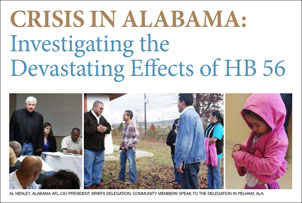NATIONAL
Report details humanitarian crisis caused by Alabama immigration law
 WASHINGTON, D.C. (Dec. 16) — An AFL-CIO report released Thursday sheds new light on the crisis Alabama immigrant families are facing as a result of HB 56, the latest and broadest law targeting immigrants. The report details what a delegation of prominent African American labor leaders saw in November when they traveled to Birmingham to document the impact and aftermath of HB 56 in the context of the ongoing civil rights struggles.
WASHINGTON, D.C. (Dec. 16) — An AFL-CIO report released Thursday sheds new light on the crisis Alabama immigrant families are facing as a result of HB 56, the latest and broadest law targeting immigrants. The report details what a delegation of prominent African American labor leaders saw in November when they traveled to Birmingham to document the impact and aftermath of HB 56 in the context of the ongoing civil rights struggles.
According to the report, none of the delegates expected the humanitarian crisis they experienced in Alabama.
“Each of us was profoundly affected by what we saw and heard. Many were aware of the law, and understood generally that it was an attempt by the state of Alabama, like many other states, to do something about the illegal immigration crisis, given the failure of the U.S. Congress to pass comprehensive immigration reform,” said William Lucy, president of the Coalition of Black Trade Unionists, delegation member and one of the authors of the report. “The parallels to Jim Crow were all too real, and the prejudice we heard about felt all too familiar.”
The report documents what immigrant families told the delegation they’re facing day to day.
“I drop my children off for school, but I’m not sure if I will be around to pick them up,” a parent told the delegation. Mothers shared their fear that they will be separated from their children and that some undocumented parents are making arrangements with church members, friends and even strangers to care for their U.S.-born children in case the parents are deported.
The shared testimonies and stories paint the devastating human consequences of HB 56 and the negative impact on the economy. The delegation met with the owner of Max’s Deli, Steve Dubrinski, whose story showed HB 56 is dividing the community. When the law went into effect, Dubrinski told The Birmingham News he was worried for his business because his workers — all Latinos and fully documented — were thinking of leaving the state.
“They are scared and I can’t blame them,” he told the paper, making clear he was speaking about his documented employees. That interview set off a firestorm. A local radio talk show called for a boycott of the deli, and Dubrinski received vitriolic hate e-mails.
Alabama teachers also testified against the law to the delegation. Richard Franklin, president of the Birmingham American Federation of Teachers said, “This is a bad law. Our organization will not stand for that because this is not fair for our members, the teachers or students. We need to invest in all our young people who seek an education, not find ways to prevent them from learning.”
Vi Parramore, president of the Jefferson County American Federation of Teachers, added, “It’s a mess, I have to tell you. It really is a mess. It’s the civil rights issue of 2011. How can you treat people like this?”
The report details that delegation members heard from DREAM students, who recounted how the law has created a level of engagement among young people:
The students, who came to this country at a young age and are American in every sense except on official paperwork, have become politically engaged in Alabama after the passage of HB 56 and have risked deportation, detention and family separation to organize their communities to advocate against the law. Their testimony was some of the most compelling and energizing we heard during our visit. They are a bold and brave group who we are certain will help change the law and get real reform at the national level.
The report concludes that, “A recurring theme throughout our visit was the devastating impact the law is having on families, which are being separated and living in fear. By the end of the day, we had heard numerous painful stories of families HB 56 has pulled apart.”
“Crisis in Alabama: Investigating the Devastating Effects on HB 56” is available here.





